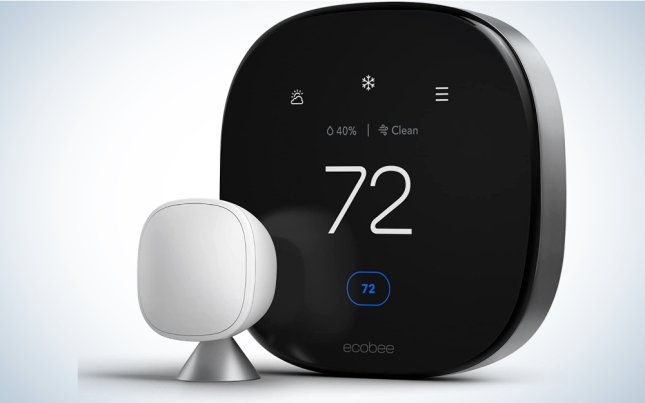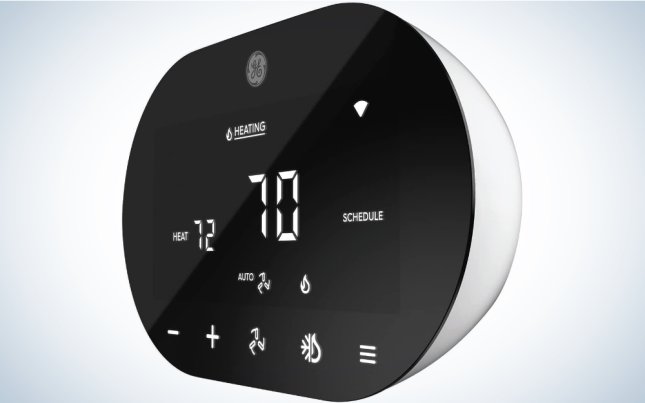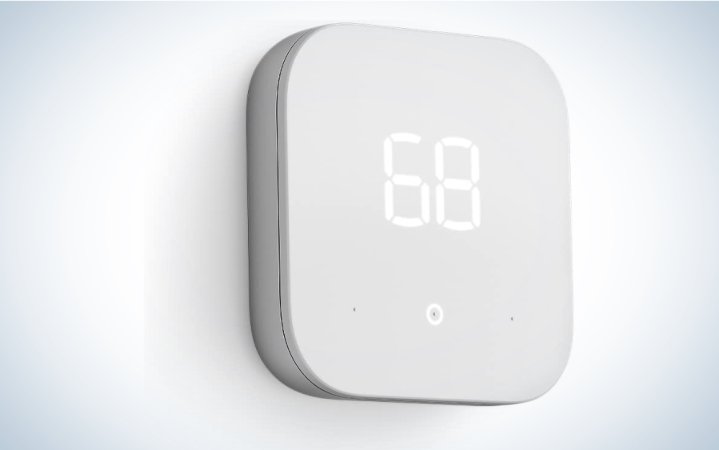We may earn revenue from the products available on this page and participate in affiliate programs. Learn more ›

Heating and cooling bills can quickly skyrocket if you don’t have a systematic method for controlling your HVAC (Heating, Ventilation, Air Conditioning) system—which is why you want a smart thermostat. This gadget gives you one of the most hands-off ways to combat cost and conquer comfort. It can monitor the temperature in your home, automatically make adjustments based on your schedule, and allow you to turn up the heat or air conditioning remotely. The best smart thermostats will keep you and your home’s heating and cooling system in sync and work so seamlessly that you’ll forget how much work it’s doing behind the scenes.
- Best overall: Google Nest Learning Thermostat
- Best for Alexa: Amazon Smart Thermostat
- Best for electric heating systems: Mysa Smart Thermostat for Electric in-Floor Heating
- Best for multiple zones: ecobee Smart Thermostat Premium
- Best value: GE CYNC Smart Thermostat
How we chose the best smart thermostats
A smart thermostat is one of the most important network-enabled gadgets you can install in your home, so we took great care when sifting through the dozens of options available today. This smart-home accessory will literally impact how comfortable you are at home and how comfortable you are with your monthly utility bill. Getting a flaky smart thermostat is not an option. We conducted some hands-on testing along with our research and only recommended options from the most well-established players in this space.
Installing a smart thermostat used to be one of the more expensive smart-home upgrades, but our research revealed companies like Amazon and GE have stepped in to provide genuinely competitive options for under $100. You’ll still have to shell out a lot more for the most premium smart-home thermostats, but you won’t need to if your needs are basic. If you’ve already gotten comfortable with some basic smart-home accessories, this is the next logical step to take your house into the future.
The best smart thermostats: Reviews & Recommendations
Smart thermostats offer distinct advantages over traditional models by taking home temperature control to a new level. These models use WiFi or Bluetooth to connect to an app that lets you monitor and control the temperature from anywhere you can get a connection. Through the app, you can set weekday or weekend schedules, access temperature controls before you step foot into the house, and get detailed analyses of your energy use or temperature patterns.
Smart-home thermostats don’t skimp on technology. Some models feature geofencing, GPS, and touchscreens among their features and options. Advancements now allow some models to learn your behaviors and preferences and then adapt the temperature schedule to anticipate your needs. It comes down to the fact that the best smart thermostats give you one less thing to worry about while saving money on your energy bill.
Best overall: Google Nest Learning Thermostat
Google Nest Learning Thermostat
Pros
- Easy to see at a glance
- Color display
- Physical buttons
Cons
- Price
Specs
- Smart-home platforms: Amazon Alexa, Google Assistant
- Supports external sensors: No
- Price: $205
The Nest Thermostat was a phenomenal success years before Google acquired its parent company, and it’s still the best option based on our hands-on testing. Instead of relying on touch controls, which can be finicky and harder to use for less tech-savvy, you turn the temperature up and down by twisting the thermostat’s outer ring. You’ll feel resistance and hear the sound of a click every time you increase or decrease the temperature. This is a big user experience win and easy to explain to folks staying at your place while you’re away.
Setting up this thermostat took about a half hour, which included the time it took to remove the old thermostat, screw in the Nest’s backplate, plug the wires into said backplate, attach the Nest, and connect it to our WiFi router. Google provides all the tools you’ll need (a screwdriver) to install the thermostat yourself, and the included step-by-step instructions make said installation a breeze. Just make sure to have your home’s WiFi password handy since you’ll need to input it during the setup process.
Once the Nest was set up, we could control it through the Google Home app (iOS and Android). Tapping on the thermostat within the app showed its current temperature, allowing us to turn it up or down or set the thermostat on a schedule. You also have the option to have the Nest Thermostat learn your schedule to manage your HVAC system more efficiently.
We’d argue that this smart thermostat’s best feature is its large color display. The screen makes it easy to see your current temperature at a glance, and it’ll turn blue or orange when you twist its outer ring to make your home cooler or warmer. Monochrome displays look cool but are more challenging to read—literally.
In our experience, the Nest did a commendable job learning our schedule, but we ultimately opted to use it manually most of the time. We appreciated having complete control over our HVAC system instead of relying on AI, but this says more about us than it does about the Nest. You may rarely have to touch this smart thermostat’s dial after giving it a couple of weeks to learn when you and the other people in your home are active and go to bed.
It may be expensive, but the Google Nest Thermostat’s intuitive interface and top-notch hardware make it the top choice.
Best for Alexa: Amazon Smart Thermostat
Amazon Smart Thermostat
Pros
- Has a model with a C-Wire adapter
- Made with recycled materials
- Supports Amazon Home Services installation
Cons
- Only works with one smart platform
Specs
- Smart-home platforms: Amazon Alexa
- Supports external sensors: No
- Price: $79.99
Amazon’s smart thermostat is an easy buy-in if you’re all-in on Alexa. It uses hardware developed by Honeywell Home, the consumer tech arm of a company that’s been around for nearly 120 years. It has an all-white minimalistic industrial design, with a digital readout of the temperature featured front and center. We’d prefer it if the temperature color on the smart thermostat were a color rather than all-white, but this won’t matter if you control it using the app (iOS and Android) or through an Alexa-enabled smart speaker.
Amazon offers this thermostat in two configurations; the only difference is that one comes with a C-Wire adapter if your home doesn’t have one. The C-Wire (known as the common wire) provides your smart thermostat with a constant power source. Most newer homes have a C-Wire running from the HVAC system to the thermostat, so this shouldn’t be an issue. That said, it’s nice that Amazon has an option for those who don’t.
The functionality of this smart thermostat is pretty basic. Still, Amazon has differentiated itself by offering installation via its Home Services program for an added fee in case you’re uncomfortable doing any electrical work. It’s also prioritized sustainability by making parts of its thermostat out of recycled materials. This is an excellent choice if you’re cost-conscious and have bought into Amazon’s hardware ecosystem.
Best for electric heating systems: Mysa Smart Thermostat for Electric in-Floor Heating
Mysa Smart Thermostat for Electric Baseboard and in-Wall Heaters V2
Pros
- Unobtrusive look
- Very simple controls
- Supports all three smart-home platforms
Cons
- Designed for heating only
Specs
- Smart-home platforms: Amazon Alexa, Google Assistant, Apple HomeKit
- Supports external sensors: No
- Price: $199
This is the only smart thermostat designed exclusively for one type of heating system, but if you have underfloor heating, there’s much to recommend. This is the smallest smart thermostat we’re recommending, and its gray color will look understated but nice against almost any wall. We’re pleased Mysa went with a gray body because it makes the temperature, displayed in white, easier to see. While we’d still prefer a color display, we like that an arrow up and arrow down—used to change your home’s temperature—are clearly visible and easy to tap.
Of course, you also have complete control over the thermostat via an app on your phone (iOS and Android). The most important thing to understand is that this smart thermostat only works with heating systems, not cooling. So if you have central air, you’ll have to look elsewhere. This won’t be an issue if your home’s cooling system comprises individual window air conditioning units. We’re pleased that Mysa went through the trouble of designing its smart thermostat with compatibility with Google Assistant, Amazon’s Alexa, and Apple Homekit, so it’ll work regardless of your smart platform of choice.
If you only need a smart thermostat for your home’s heating system and have either a baseboard or in-wall heating system, Mysa’s Smart Thermostat is a great choice.
Best for multiple zones: ecobee Smart Thermostat Premium
ecobee Smart Thermostat Premium
Pros
- Monitors air quality in addition to temperature
- External sensor support
- Support for all three smart-home platforms
Cons
- Price
Specs
- Smart-home platforms: Amazon Alexa, Google Assistant, Apple HomeKit
- Supports external sensors: Yes
- Price: $249
If you want to control the temperature in a large home, your best bet is to use a smart thermostat that supports external sensors. This will ensure that every room of your place—even those furthest from the thermostat—will be heated or cooled evenly. The best option in this category is ecobee’s Smart Thermostat Premium, and it isn’t even close. The face of this thermostat is black, which makes the temperature, which is displayed in white, stand out. You’ll be able to clearly see the current temperature at a glance and change it with a couple of taps. You can also make changes through ecobee’s iOS or Android app.
Ecobee bundles its smart thermostat with a single sensor, but you can get more based on your home’s needs. The sensor must be plugged into power but will wirelessly communicate data to the thermostat. Both the thermostat and sensor can also monitor the air quality in your room, which is a nice touch. If your smoke alarm goes off, this smart thermostat can detect it and notify your phone.
All of our smart thermostat recommendations work with one or more smart-home assistants, but this is the only one with a built-in microphone that allows you to communicate directly with Amazon’s Alexa. This is a great feature if you don’t have an Echo or the one you use isn’t in the same room as your thermostat. The ecobee Smart Thermostat Premium also works with Apple’s HomeKit and Google Assistant (and is actually part of our recommended Google smart-home set-up); however, using these assistants with the thermostat will require additional hardware.
If you’ve been struggling to get your HVAC system to moderate the temperature of your entire home and don’t mind spending the money on a smart thermostat and sensor, ecobee’s Smart Thermostat Premium is your best splurge.
Best value: GE CYNC Smart Thermostat
GE CYNC Smart Thermostat
Pros
- External sensor support
- Part of a larger smart-home ecosystem
- Price
Cons
- Bulky
Specs
- Smart-home platforms: Amazon Alexa, Google Assitant
- Supports external sensors: Yes
- Price: $99
This smart thermostat is a little bigger than our other recommendations, but its value is undeniable if you don’t mind its size. This is one of only two smart thermostats we’re recommending that work with external sensors to provide consistent heating and cooling to every room of your home. GE doesn’t bundle its smart thermostat with any sensors but only charges $17.99 for one. You could outfit several rooms with these sensors at that price without hitting the price of ecobee’s smart thermostat. However, that one supports HomeKit, has Amazon’s Alexa built-in, and can sense smoke detectors, which are features this model lacks.
Still, GE made smart design decisions, like making the front of its thermostat black so its temperature reading and controls are easy to see and manage. You can also access these settings through GE’s iOS or Android app. While it doesn’t work with Apple’s HomeKit, this smart thermostat can be integrated into smart homes based on Amazon’s Alexa or Google Assistant. And unlike our other smart thermostat recommendations, this one from GE is part of a larger ecosystem of smart-home accessories. If you invest in GE’s Cync light bulbs and smart plugs, you can manage them through a single app.
If you want a smart thermostat that punches well above its weight, GE’s Cync Smart Thermostat is the best value and a clear choice.
What to consider when shopping for the best smart thermostats
There are many factors to consider when selecting the correct smart thermostat for you. These are the ones we considered most heavily when selecting the models for this story.
Supported smart-home platforms
Every smart thermostat can be controlled using an app on iOS and Android, but many can also be connected to smart-home platforms designed by Amazon and Google. This will allow you to adjust your home’s temperature by using smart-home assistants like Alexa and Google Assistant.
Size of your home
If you have a multi-story home, there’s a good chance it’s been split into different heating or cooling zones. You’ll know this is true if your house or apartment has multiple thermostats. If that’s the case, you’ll need to replace every thermostat in your home with a smart one to gain complete control over your HVAC (Heating, Ventilation, Air Conditioning) system (and maybe remember to replace your HVAC filters while you’re at it). You can install one smart thermostat at a time, but you’ll only be able to adjust the temperature in that zone.
Remote sensors
If your home has a single zone, there’s still the chance that one room far away from the thermostat and HVAC system won’t be comfortable. This is because the thermostat’s temperature sensors, which determine when to turn it on and how long to engage your HVAC system, can only use data from the room they’re in. Some smart thermostats work with remote sensors, which can be installed in those rooms to feed additional data to the thermostat. If you use a remote sensor, your HVAC system will stay on until every room in your home reaches your specified temperature.
C-Wire
The common wire (abbreviated to C-Wire) is a cable that needs to run from your HVAC system to your smart thermostat to provide power. The color of this cable is typically blue, so you can check whether your current thermostat is connected to this wire by removing it from your wall without disconnecting it. If you don’t have a C-Wire, you’ll need to call an electrician to run one.
HVAC system
Many smart thermostats will work with multiple types of HVAC systems, but some were designed with specific heating or air conditioning equipment in mind. The more limited smart-home thermostats are less expensive but may not work if you upgrade your HVAC system down the line or take them with you to another home.
FAQs
The downfalls of smart thermostats typically come from connectivity issues. If you have slow WiFi, one of these devices could be frustrating because you can’t connect to make schedule changes. In these cases, you may often end up using manual controls.
Yes, some smart thermostats can detect room occupancy. They do that through motion detection or sensing the app on your phone. Those that use motion detection will detect all of your family members (including pets), while those that detect the app may only recognize you in the room if you have your phone.
In many ways, a smart thermostat is better than a programmable thermostat. Smart models offer more information, like energy usage and temperature patterns, for more precise control. Smart thermostats also let you adjust the temperature when you’re away from home, which programmable models do not.
Our smart thermostat recommendations range from $65 to $237, with plenty of prices in between. The amount you pay will be based on which features you need.
Final thoughts on the best smart thermostats
- Best overall: Google Nest Learning Thermostat
- Best for Alexa: Amazon Smart Thermostat
- Best for electric heating systems: Mysa Smart Thermostat for Electric in-Floor Heating
- Best for multiple zones: ecobee Smart Thermostat Premium
- Best value: GE CYNC Smart Thermostat
The best smart thermostats monitor the temperature for you. They collect information that helps you (or them) make informed decisions about energy usage. These new thermostats take work out of your hands, so you can relax in your home’s cozy warmth or blessed chilliness, depending on what you prefer. Look for features that work with your lifestyle, like geofencing if you want your house to jump to attention when you pull up or learning capabilities if you want it to adapt the schedule to your preferences. In the meantime, the best smart thermostat will reduce your energy bill, save time, and make your home look ultra-modern.








